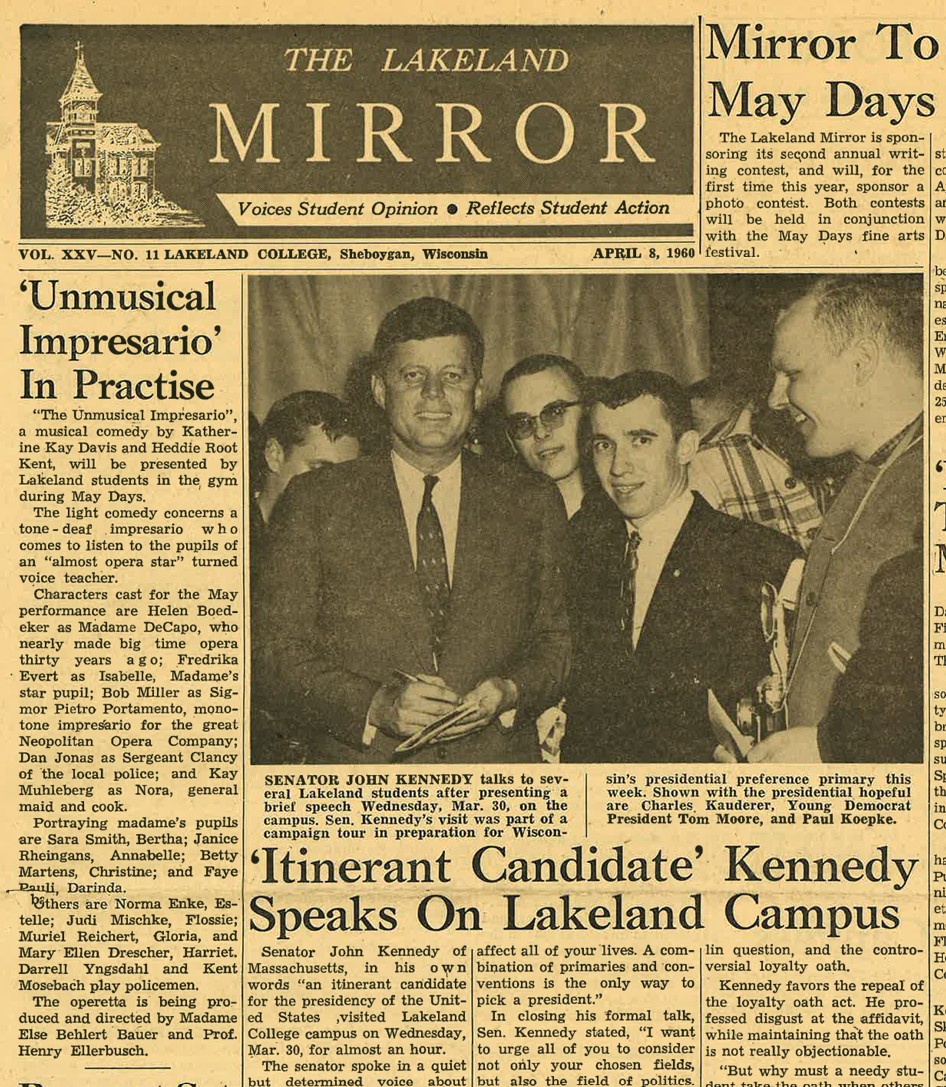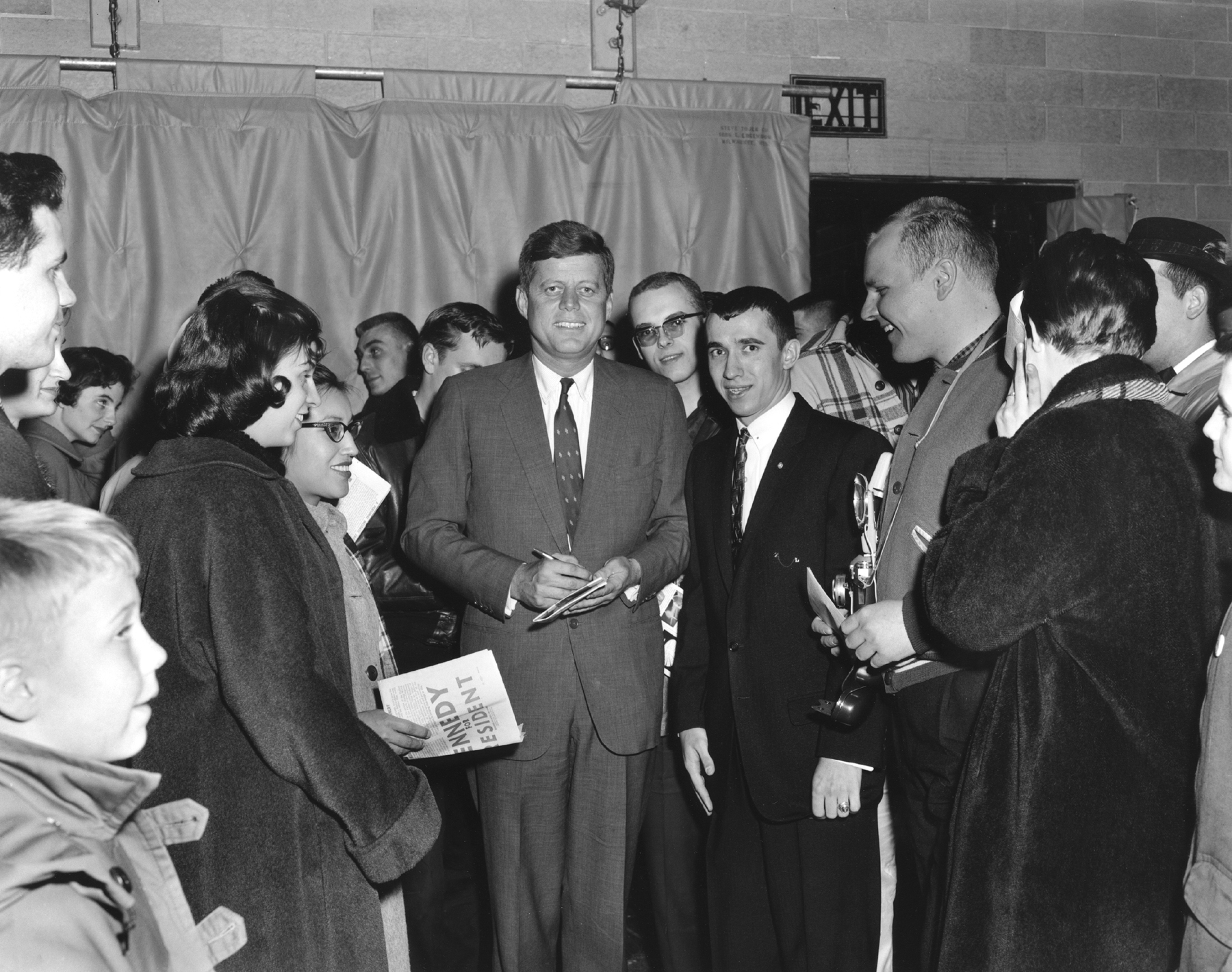When John F. Kennedy Visited Lakeland in 1960
By Patrick Parr
On March 30, 1960, John Fitzgerald Kennedy (1917 – 1963) visited Lakeland College during the Democratic primary election. At that time, Kennedy, 42, was a popular Massachusetts senator who’d won his last senate election in a landslide, earning nearly 74% of the vote, the largest in Massachusetts state history.
But Kennedy had his mind set on the presidency. Fourteen months after his historic senate re-election, in January 1960, Kennedy announced that he would begin campaigning to be America’s 35th president.
By the time Kennedy reached Sheboygan, Wisconsin, he’d already won the first primary, New Hampshire, but no major contender had yet to step forward. For Wisconsin’s primary, set for April 5, 1960, Kennedy was locked in a tight duel with Minnesota senator Hubert H. Humphrey, who also visited Lakeland during the primaries.
On March 29, Kennedy arrived with his wife Jacqueline and cousin Polly Fitzgerald at Sheboygan’s Hotel Foeste (near 930 N 8th St) which would later be torn down in 1960 for what was to become the Fountain Park Motel (which closed in January 2025).
At 5pm on March 30, Lakeland students and alumni crammed into what was then the gym in Founder’s Auditorium. Now, according to Lakeland’s Director of External Relations, David Gallianetti, the space where Kennedy spoke is the Bradley Fine Arts Building.
Kennedy was introduced by Lakeland’s 9th president, Dr. Arthur Krueger. In his intro, Krueger, a Republican, made sure to let Kennedy know that a recent survey of Lakeland alumni showed that 95 percent of Lakeland graduates placed their vote in the 1956 presidential election, won by Republican Dwight D. Eisenhower. When Kennedy took the podium, he spoke directly to Krueger. “That would make me happy, IF they were all Democrats.”
Kennedy had spent a full day in Sheboygan, greeting thousands of residents. In fact, as Sheboygan Press columnist Chuck Fisher wrote, “After a long day of shaking hands in several cities, more than 1,000 in Sheboygan alone, I asked the senator how his hand felt. I examined it closely and saw that the entire hand was puffed, black and blue and several large blisters on the little finger had broken open and the loose skin rubbed off. And yet the senator never once declined to offer his hand to a well-wisher. Try to imagine how your hand would feel after having it pumped, grasped, squeezed, shook and yanked thousands of times every day. The rigors of campaigning must be most worrisome.”
Difficulties aside, Kennedy spoke at Lakeland for "almost an hour," as the Lakeland student newspaper, The Mirror, reported. The newspaper mentioned that Kennedy spoke of the issues of 1960, such as "Cuba and Castro, civil rights legislation, [and] the [nuclear] arms race..."
Kennedy had made headlines in 1960 for prioritizing primaries during his run for election, believing the more people who could participate in voting, the better it would be for the country. "Why should a small group of people choose your president? His decisions affect all of your lives. A combination of primaries and conventions is the only way to pick a president."
Mary Gordon, a 1961 Lakeland graduate, recalled March 30, 1960 with tremendous clarity, even after many years. “When Kennedy entered the gym to give his speech, we were all sitting on hard folding chairs that were placed on the gym floor. No one stood as he entered, but everyone turned their heads to watch him walk down the aisle toward the stage. After the speech, a line formed to shake his hand. I chose not to stand in line, a choice I regret today.”
Kennedy knew his audience, so he ended his talk by encouraging the young leaders before him. "I want to urge all of you to consider not only your chosen fields, but also the field of politics. There is no life more rewarding and no greater opportunity for advancement than in United States politics today."
His words may sound inspiring when written out, but as another Lakeland student, Karl Vercouteren (Class of 1961), recalled in Lakeland's alumni magazine in 2004, the audience wasn't yet enamored by Kennedy. In fact, many ended up leaving before his final words. “As Senator Kennedy neared the end of his speech, a large portion of his audience got up and walked out of the gym," said Vercouteren. "It was quickly explained to the senator that these were members of the Lakeland choir leaving for an evening concert, but the damage had been done. The hasty explanation to the bewildered speaker signaled the end of the speech."
Later, the 1960 editor of The Mirror expressed his annoyance at what he termed a "walk out." In his words, "The choir displayed a lack of the respect which is due any speaker. Choir members should have sat in the back of the room, and someone should have informed Sen. Kennedy that they were leaving … Let's see that it doesn't happen again – no matter whether a senator, a professor, or a fellow student is speaking."
The choir walk-out incident had little effect on the final vote. Kennedy ended up winning the Wisconsin primary, earning over 56% of the vote, with Humphrey managing 43%.
Three and a half years after visiting Lakeland, on November 22, 1963, President Kennedy was assassinated in Dallas, Texas. The tragedy stunned the nation. Lakeland cancelled its Monday classes, and Dr. John Bell Morland, Lakeland’s 10thpresident, issued a statement: “Such an event is shocking beyond the comprehension of Americans and people everywhere. The world, the United States and Wisconsin are saddened by the loss of this great man. The causes of freedom, education, both public and private, will not soon again know a friend his equal.”
As LUJ Professor of History Dr. Adam Tompkins reminds us, President Kennedy's legacy can still be felt today. "Kennedy, of course, is perhaps the most iconic of modern American presidents who made an outsized impact on American politics even after his passing. If I had to sum up his greatest contribution, I would say that it was his level-headed optimism and youthful energy that embraced the politics of the possible in striving to build the proverbial more perfect union and world. He fostered an ethic of service that contributed to the greater good. This is at the heart of his 1961 inaugural address where he famously urged Americans to 'ask not what your country can do for you--ask what you can do for your country.' It is also the core of the Peace Corps program that he created, a program that offered a service option to young Americans who wanted to help build a better world."
Dr. Tompkins believes this idealism, to help bring positive change to the world, seems to be in decline these days. "America, I think, needs to return to that valuation of public service in its many forms."
Special thanks to LUW's Ann Penke, David Gallianetti, and Lucretia Crawford for helping with research.
---------
Follow Lakeland University and Lakeland University Japan on Instagram.

